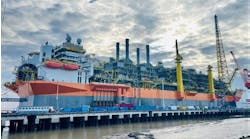Offshore staff
LONDON – Demand for oil demand may continue to grow for another decade or so, or could tail off rapidly later in this decade, Wood Mackenzie suggests, if the world community acts to limit global warming to 2°C (35.6°F) by 2050.
Under either scenario there is still a huge amount of upstream value to be derived. Based on the consultant’s global Lens asset-by-asset modeling service, future pre-tax valuations for upstream range from $9-23 trillion: on a post-tax basis, operators’ share ranges from $3-9 trillion.
Wood Mackenzie vice president Fraser McKay said: “The industry now finds itself having to supply oil and gas to a world in which future demand – and price – are highly uncertain. The range of possible outcomes is dizzying.
“But the world will still need oil and gas supply for decades to come, and the scale of the industry will remain enormous.”
Delivery and discipline will remain critical throughout the upstream value chain as the environment for oil and gas gets tougher. Although budget/timeline delivery for projects has improved since the previous downturn, the industry must continue to push for improved efficiency, lower costs, and flawless project delivery, the consultant warned.
Wood Mackenzie research director Angus Rodger said: “Only exceptional, low-cost projects will work in all demand scenarios. Inevitably, the cost of capital and the cost of doing business in oil and gas will increase.”
Oil and gas companies will also have to work on their environment, social, and governance credentials. But while new energies will play an increasing role for the major players, this is a not an option for many others, which will have to cut their Scope 1 and 2 emissions to in order to limit their exposure to increasingly expensive debt.
And while investment looks set to shift away from oil to gas, “the industry will have to figure out the conundrum of weaker economics if the giant gas projects the world needs are to happen,” Rodger claimed.
“The returns on developing a barrel of oil are currently higher, with oil production and cash-flow profiles delivering more value upfront. Gas prices are lower than oil prices on an energy-equivalent basis; that relationship will have to invert…to make this happen.”
McKay concluded: “Just a few more years of firm oil prices would strengthen balance sheets, making transition strategies easier to execute.”
05/20/2021



